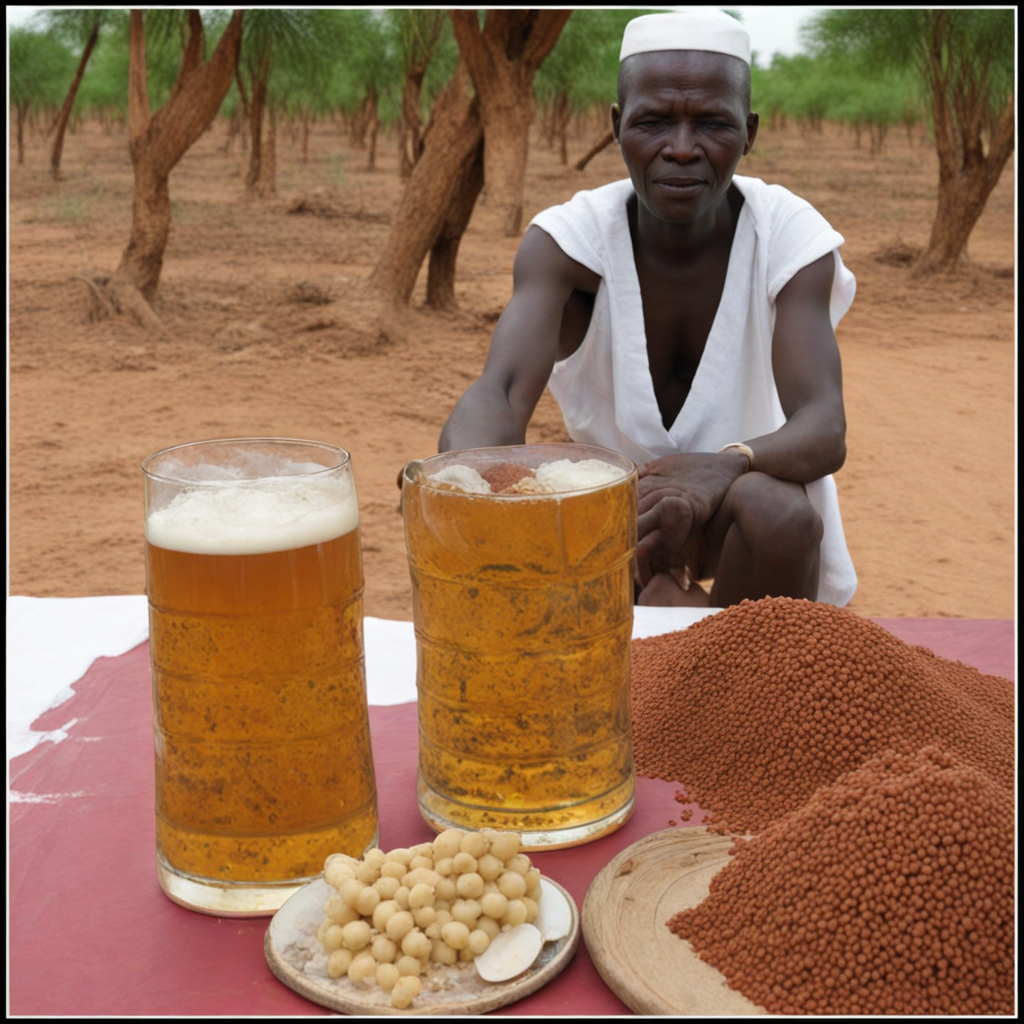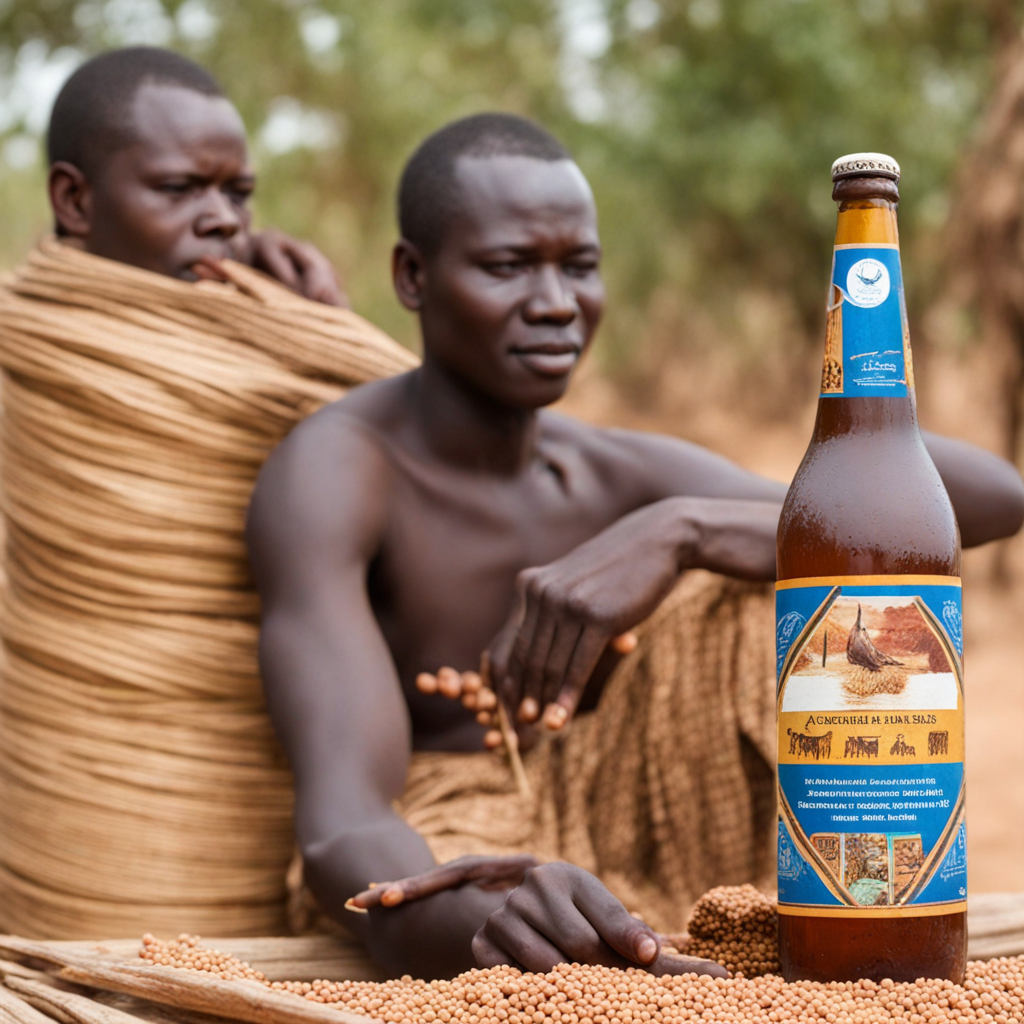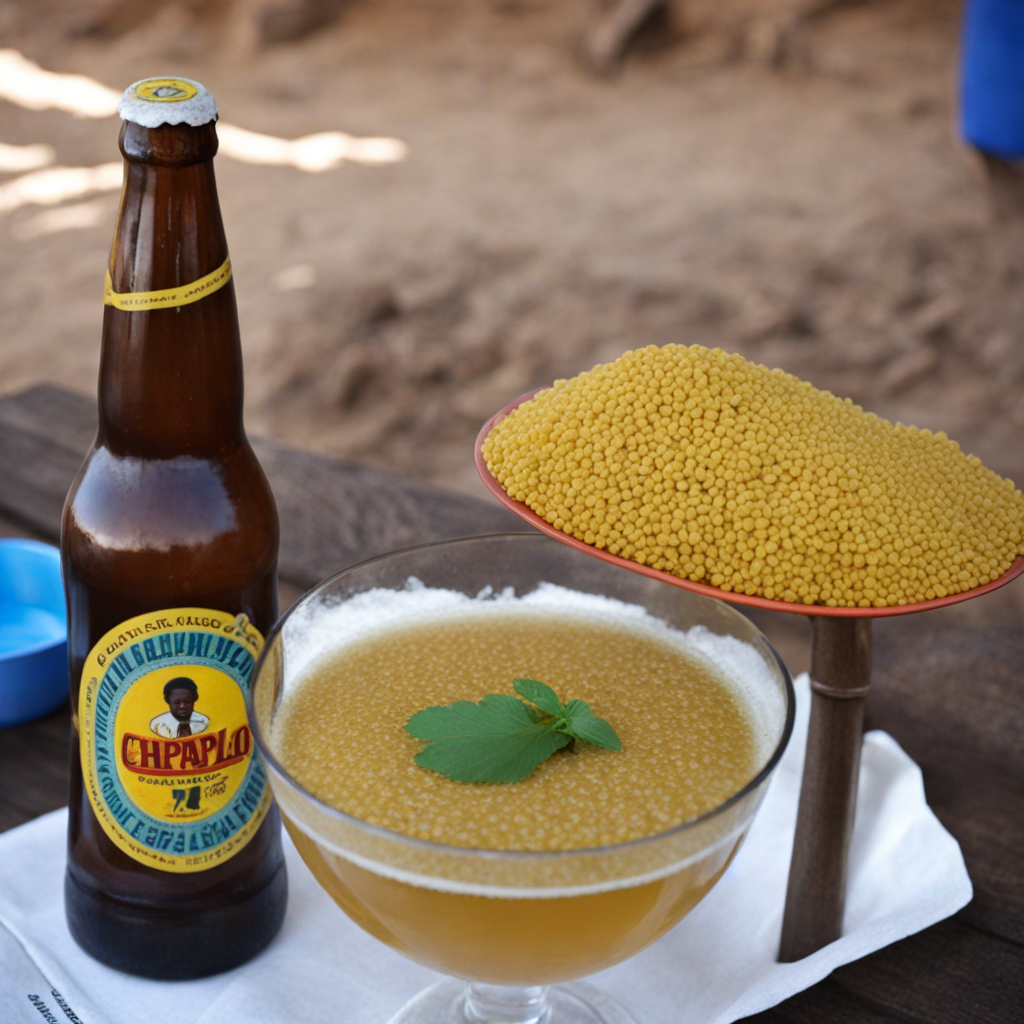Sorghum Beer
Sorghum beer, known locally as 'tchapalo' in Burkina Faso, is a traditional alcoholic beverage that embodies the rich agricultural heritage of the region. Made primarily from sorghum, a drought-resistant grain that thrives in the Sahelian climate, this beer offers a unique flavor profile that is both earthy and slightly sweet. The brewing process involves fermenting the sorghum grains with water and sometimes adding other local ingredients like millet or corn to enhance the taste. The result is a cloudy, light-colored drink that is refreshing and slightly effervescent, perfect for enjoying on a warm day. The taste of sorghum beer is intriguing for those eager to explore new flavors. Its initial sip reveals a mild sweetness that gradually transitions into a more robust, grainy character, reminiscent of whole grains and nuts. The fermentation process imparts a subtle tanginess, giving it a slightly sour note that balances the sweetness. This complexity makes sorghum beer not just a drink, but a delightful experience for the palate. Additionally, the drink is often served chilled, making it an ideal accompaniment to Burkina Faso's diverse cuisine, which includes grilled meats, spicy stews, and rich vegetable dishes. Sorghum beer is more than just a beverage; it is an integral part of Burkina Faso's culture and social life. Traditionally brewed by women in rural communities, it is often enjoyed during celebrations, gatherings, and rituals, fostering a sense of community and connection. The beer is typically served in calabashes or communal bowls, encouraging sharing and camaraderie among friends and family. As you sip on this unique drink, you not only taste the flavors of Burkina Faso but also partake in a cultural tradition that has been passed down through generations, making it a truly authentic experience.
How It Became This Dish
Biére de Sorgho: A Cultural and Culinary Treasure from Burkina Faso Biére de Sorgho, or sorghum beer, is a traditional alcoholic beverage that plays a significant role in the cultural and social fabric of Burkina Faso, a landlocked country in West Africa. Distinctively brewed from sorghum, a cereal grain that thrives in arid regions, the beer embodies the agricultural heritage and communal practices of the Burkinabé people. The history of Biére de Sorgho is not just a story of fermentation; it is a vibrant narrative that reflects the resilience of its people, their agricultural practices, and their deeply rooted cultural traditions. Origins and Agricultural Significance Sorghum, a drought-resistant cereal grain, has been cultivated in Africa for thousands of years, with its origins traced back to the African continent. It is one of the most important staple crops in the Sahel region, known for its ability to grow in poor soil and withstand harsh climatic conditions. In Burkina Faso, sorghum is not only a vital food source but also an integral part of the local economy. The brewing of sorghum beer dates back to ancient times, well before the arrival of colonial influences in West Africa. Traditionally, this beverage was made by women, who played a pivotal role in both agriculture and food preparation. The process of making Biére de Sorgho involves germinating the sorghum grains, which are then dried, roasted, and ground into flour. This flour is mixed with water and left to ferment, creating a mildly alcoholic beverage that is often cloudy in appearance. This brewing tradition is deeply embedded in the communal practices of Burkina Faso. Biére de Sorgho is often produced for social gatherings, ceremonies, and celebrations, highlighting its role as a medium for social interaction and cultural expression. From weddings to harvest festivals, the sharing of sorghum beer signifies hospitality and community bonding. Cultural Significance The cultural importance of Biére de Sorgho extends beyond its consumption. It is a symbol of identity and heritage among the various ethnic groups in Burkina Faso, including the Mossi, Gourounsi, and Lobi communities. Each group has its unique brewing methods and rituals that accompany the production and consumption of the beer, reflecting the rich tapestry of cultural diversity in the region. In many communities, Biére de Sorgho is not just a beverage; it is a part of the spiritual landscape. It is often offered to ancestors during ceremonies, signifying respect and remembrance. The beer is also used in rites of passage, such as childbirth and initiation ceremonies, where it plays a vital role in enriching the communal experience. Moreover, the production of sorghum beer is a communal activity that fosters cooperation and solidarity among women. The brewing process often involves groups of women working together, sharing knowledge and skills, and reinforcing social ties. This aspect of brewing has empowered women economically and socially, allowing them to take pride in their contributions to their families and communities. Development Over Time As Burkina Faso navigated its colonial past and subsequent independence in 1960, the brewing traditions of Biére de Sorgho adapted to changing social and economic landscapes. During colonial rule, the introduction of European beers challenged local brewing practices. However, the resilience of the local communities ensured that traditional sorghum beer remained a staple, particularly in rural areas where access to imported beverages was limited. In the post-independence era, there was a renewed interest in promoting local products, including Biére de Sorgho. The government and various NGOs recognized the potential of traditional brewing as not only a means of preserving cultural heritage but also as a way to enhance food security and empower local economies. Initiatives to formalize and commercialize sorghum beer production emerged, aiming to improve quality and introduce the beverage to wider markets. With globalization and the rise of craft brewing, Biére de Sorgho has also found its place in the modern market. Artisanal producers have started experimenting with flavors and brewing techniques, appealing to both local and international consumers. The beer has gained popularity beyond Burkina Faso’s borders, contributing to a broader appreciation of African foodways and beverages. Despite these advancements, challenges remain. Climate change poses a significant threat to sorghum cultivation, affecting the availability of raw materials for brewing. Additionally, the influx of mass-produced beers can overshadow traditional brews, risking the cultural significance of Biére de Sorgho. However, the resilience of the Burkinabé people and their commitment to preserving their heritage have led to initiatives aimed at promoting sustainable agricultural practices and protecting traditional brewing methods. Conclusion Biére de Sorgho is more than just a drink; it is a narrative of Burkina Faso’s history, culture, and social dynamics. From its ancient roots in sorghum cultivation to its role in contemporary society, this traditional beer encapsulates the essence of community, resilience, and identity among the Burkinabé people. As the world becomes more interconnected, Biére de Sorgho stands as a testament to the importance of preserving local traditions while embracing innovation. Its rich history continues to evolve, reflecting the spirit of a people who honor their past while looking toward the future. In every sip of Biére de Sorgho, there lies a story—a story of a culture that has thrived against the odds, celebrating life, community, and the enduring legacy of its agricultural practices.
You may like
Discover local flavors from Burkina Faso







